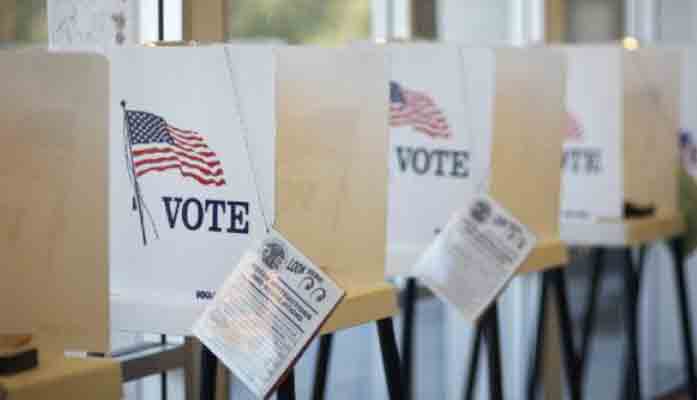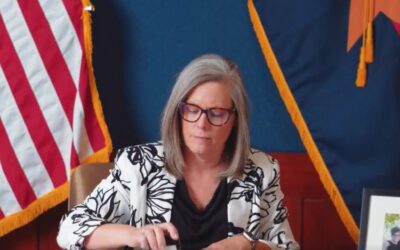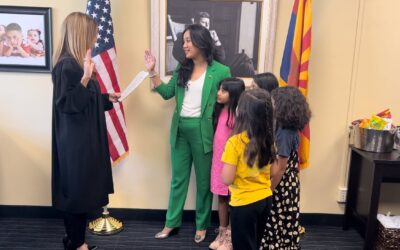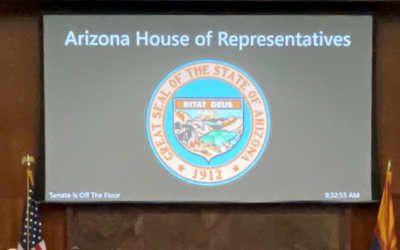By Terri Jo Neff |
Kris Mayes may have been sworn in as Arizona Attorney General earlier this month, but the legal arguments over whether she received the most lawfully cast votes is still ongoing, with a decision expected in a few weeks on whether Republican candidate Abe Hamadeh should be granted a second trial in his election contest.
Hamadeh’s motion for a new trial has been opposed by Mayes, Maricopa County, and new Arizona Secretary of State Adrian Fontes, who took over as a defendant when then-Secretary Katie Hobbs was sworn in as Governor. Hamadeh’s reply to the oppositions is due Feb. 6 and is reportedly being written by Jen Wright, the former head of the Election Integrity Unit under Attorney General Mark Brnovich.
After the reply is filed, Judge Lee Jantzen of the Mohave County Superior Court can either rule based on the written pleadings or set a hearing for oral arguments. Any decision Jantzen makes will likely be appealed to the Arizona Supreme Court, which could keep the case in limbo for weeks.
Jantzen dismissed Hamadeh’s election challenge Dec. 23 after a brief trial that featured the results of an expedited and limited inspection of ballots in just a few of Arizona’s 15 counties. The inspections were undertaken in an effort to obtain evidence supporting Hamadeh’s claim that thousands of votes cast for him were not counted during the Nov. 8 General Election.
The evidence presented to Jantzen, however, did not include reports of tabulation problems experienced by Pinal County. Those reports were not made public until Dec. 29 when the statewide recount results were announced, cutting Mayes’ margin from 511 votes to 280 votes out of more than 2.5 million ballots cast.
In a Jan. 3 motion for a new trial, Hamadeh’s legal team points out Hobbs in her then-role as Secretary of State, did not disclose the extensive Pinal County problems to Hamadeh or the judge, even though Hobbs had direct knowledge of the issues prior to the trial. It is enough reason to allow for a more in-depth review of uncounted votes in the attorney general’s race across the state, Hamadeh argues.
The argument for a new trial recently got a boost from Arizona’s top two lawmakers.
In an Amici Curiae (friends of the court) brief, Senate President Warren Petersen and House Speaker Ben Toma urge Jantzen to “afford the parties a full and fair opportunity” to determine to answer the pivotal question of which candidate received the highest number of votes for Attorney General in the 2022 General Election.
Petersen and Toma take no position on who is the legitimate winner. Instead, they point to the fact Hamadeh now has “the kind of salient evidence” that Mayes, Hobbs, and Maricopa County argued Hamadeh had to supply to prevail during trail.
The Jan. 25 brief argues those same parties argue it is simply too late for Jantzen to do anything about it on behalf of Arizona voters. But that is not what the Legislature intended when it created state laws which allow voters and candidates to challenge the proclaimed “official” election results, according to the brief.
“The nearly unprecedented circumstances surrounding this proceeding underscore the judiciary’s indispensable role in ensuring that the certified winner of an election did, in fact, receive the highest number of lawful votes,” the brief states, adding Arizona law has “for more than a century afforded contestants a nearly unqualified right to inspect all voted ballots upon a minimal threshold showing of good cause.”
Toma discussed the amici curiae brief shortly after it was filed, pointing to the important role judges like Jantzen play in preserving election integrity.
“Election contests promote transparency, fact-finding, and an independent judicial inquiry when there are credible questions surrounding the accuracy of certified election results,” Toma explained.
In the meantime, Jantzen has another matter he needs to rule on.
Several persons were appointed to serve as ballot inspectors for the various parties during Hamadeh’s trial last month. Compensation for those inspectors is mandated under state law at a rate fixed by the court.
Jantzen, however, did not announce the rate in advance. As a result, those inspectors cannot be paid until an appropriate court order is issued.
Mayes has requested nearly $2,900 for the ballot inspector she chose for review of ballots in Maricopa County, a rate of $445 per hour for 6.5 hours. Meanwhile, Mohave County Attorney Matthew Smith is asking Jantzen to authorize payment to its inspector for 7.5 hours of work on the pay scale similar to an attorney in private practice.
Navajo County also filed a motion to compensate the three inspectors who traveled to Holbrook to inspect ballots in that county. Each of the three traveled at least 100 miles roundtrip and worked between 7 and 9.5 hours.
Unlike the motions by Mayes and Mohave County, the compensation request by Deputy County Attorney Jason Moore of Navajo County took no position on the hourly rate for the inspectors.
Hamadeh’s legal team has until Jan. 31 to respond to the compensation motions. Jantzen can then request additional arguments or issue an order.
Terri Jo Neff is a reporter for AZ Free News. Follow her latest on Twitter, or send her news tips here.








